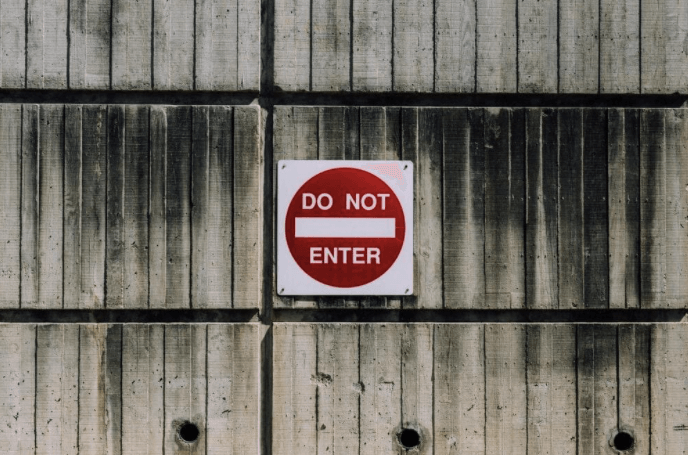Retail investors are finding it difficult to buy bitcoin with their debit cards, here’s how to get around the block and forget FOMO.
Maybe it’s the stimulus. Maybe it’s a faltering faith in fiat. Maybe it’s because retail buyers are starting to reclaim their space in the market. Maybe, just maybe, it’s none of these things– but whatever the reason, more retail investors are flocking towards the best crypto trading platform that they can find to try and scoop up as much of the digital gold as their budgets will allow. However, they’re finding that it’s not necessarily the budget that’s blocking them, but their banks.
Largely because of lack of regulation, or regulatory framework, many are finding that their banks are disallowing purchases of crypto– even if cards sport names like Visa or MasterCard– two of the biggest names in finance that have begun to support cryptos. For many institutions it’s illegal for them to process these types of transactions, just as it would be for them to process transactions for online gambling. For some other institutions, those that are operating in more crypto friendly countries, it’s just easier for them to disallow crypto purchases. Largely because even if buyers are operating in conjunction with reputable crypto platforms, there’s still a ton of third-party intermediaries to contend with– something banks don’t like to do.
But perhaps the most compelling reason that banks prefer not to deal with crypto is that it’s a wildly speculative– and risky– market. Because of the price volatility, uncertainty, and unfairly reported “criminality” of cryptos, many banks don’t want to deal with customers who could wind up making poor investment choices and then bringing that anger back to them. So how do you buy crypto when your bank has decided it’s not going to deal with the market? Well, you’ve got options.
Bitcoin ATM
Bitcoin ATMs are becoming increasingly popular, especially as the un–, under–, and frustratingly banked search for better buy-in options. Bitcoin ATMs are popping up all over the world and offer investors the opportunity to purchase, sell, and in some instances– even trade, Bitcoin in a safe and largely anonymous way. Many of these machines accept both credit/debit payments as well as cash. So, they offer an excellent alternative if your bank continues to shut down your online BTC purchases.
Finding a Bitcoin ATM near you can be difficult, especially if you don’t live within the US or Australia– both well known for their abundance of readily accessible machines. So while it’s a great way to get your hands on some Bitcoin, the machines are still not available globally, which means you’ll need to explore some other avenues of on ramps into the crypto space.
Peer to Peer Platforms
Peer-to-peer platforms (P2P) are a decent way to circumvent your banks less than friendly approach to crypto. As most of these payments just look like simple bank transfers to another person. Which is because that’s exactly what they are. Peer to peer networks essentially work like the Craig’s List of crypto, putting buyers directly in touch with sellers and vice-versa. While these platforms come with no guarantees and prices can vary between stellar deals and highway robbery– so you’ll need to be hyper aware of market prices, what you’re willing to pay, or how much you’re willing to accept.
Most P2P platforms also have a native vetting system when it comes to rating sellers and buyers. This is one way that platforms help to avoid scams or flakey buyers and sellers. Make sure that you familiarize yourself with the platform and any rating system they use to vet their users. This will help to better protect yourself and your investment.
Payment Portals
Obviously, the gold standard of buying Bitcoin or any other cryptocurrency is using a crypto trading platform or exchange. Many of these platforms have some bad history with banks and credit institutions, where it used to be next to impossible to purchase coins at these places using credit or debit cards. Luckily thanks to big name payment portals like Apple Pay, PayPal, Visa and MasterCard finally providing support for crypto purchases, many financial institutions are finding it more and more difficult to block crypto transactions and purchases.
But, in order to really circumvent almost-buyer’s remorse, you’ll want to check with both your crypto platform of choice and your main banking institution to see what their policies on crypto purchases look like. Some banks throughout the US still see cryptos as an unregulated, and even illegal, purchase, so they can block the transaction, making it impossible to buy in these arenas.
Disclaimer: This article contains sponsored marketing content. It is intended for promotional purposes and should not be considered as an endorsement or recommendation by our website. Readers are encouraged to conduct their own research and exercise their own judgment before making any decisions based on the information provided in this article.


























![“Does Everyone Hear Me OK?”: How to Lead Virtual Teams Effectively iStock-1438575049 (1) [Converted]](https://www.europeanbusinessreview.com/wp-content/uploads/2024/11/iStock-1438575049-1-Converted-100x70.jpg)




